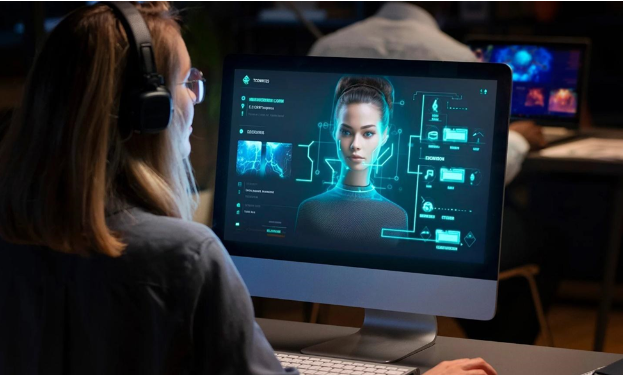According to Ranking blog, In the ever-evolving world of gaming, artificial intelligence (AI) has emerged as a transformative force, reshaping how games are developed and experienced. From the early days of simple algorithms to today’s sophisticated machine learning models, AI in gaming development has come a long way. Let’s dive into the fascinating journey of AI in gaming and explore its current applications and future potential.
Unleashing Creativity: The Role of AI in Shaping the Next Generation of Video Games
Such intelligent systems are defined as the reproduction of human intelligence processes through the use of computers, reducing dependency on human skill or experience. For instance, AI enhances interactivity, providing unique experiences in face and content interactions, characters, and scenarios. AI in gaming used to be simpler, relying on decision trees and rule-based systems, as seen in games like Pac-Man or Chess. Although the concept of AI was initially introduced to facilitate decision-making in military games, it has evolved over the years, resulting in more sophisticated and capable AI models for gameplay.
Key Roles by Areas of AI in Gaming Development
● Character AI
A more specific topic worth exploring in connection with the use of AI in gaming is that of NPCs. These characters are designed to be realistic and respond to players’ actions within a game. By using natural language processing (NLP), it is possible to make NPCs more human-like, enabling them to interact with players and engage in meaningful dialogues. Additionally, through machine learning, NPCs can be created with unique behaviors tailored to each player’s actions, ensuring that every dialogue is unexpected and dynamic.
● Procedural Generation
AI is also transforming the paradigms of game worlds through procedural creation. This technique adapts the process of content generation in a game, such as levels and environments, leading to an ever-evolving and often unpredictable gameplay experience that continually garners player interest. Games like No Man’s Sky have utilized procedural generation to design planets with forests and seas, as well as galaxies filled with stars and planets, providing players with infinite possibilities.
● Game Balancing
It can be a challenging puzzle to determine how to make a game interesting without making it unreasonably difficult. Game balancing can be achieved by having AI analyze player data and make necessary adjustments to the game mechanics. This not only enhances the gameplay experience for players but also reduces the time and effort spent on testing and tweaking.
● AI-powered gameplay
Developers are increasingly using AI to create enemies that can learn and adapt to player strategies. This leads to more challenging and rewarding gameplay, as players must continually evolve their tactics to succeed. AI-driven game modes and challenges offer fresh experiences, keeping players engaged and coming back for more.
Benefits of AI in Gaming Development
The integration of AI in gaming development brings numerous benefits. Enhanced player experiences are perhaps the most significant, as AI creates more immersive and dynamic worlds. Additionally, AI can reduce development costs by automating complex tasks, allowing developers to focus on creativity and innovation. This, in turn, leads to increased game innovation, as developers can experiment with new ideas and mechanics without being constrained by traditional development processes.
The Evolution of AI in Gaming
The story of AI in gaming development is one of fascinating technological evolution. In the early days, AI was limited to solving relatively simple problems, primarily involving decision-making processes, such as the predictable movements of ghosts in the popular game Pac-Man. These basic behaviors and their corresponding systems laid the groundwork for what AI would become in the 1990s with games like The Sims and Half-Life. These titles introduced new AI behaviors, enabling NPCs to respond to player actions in more complex ways.
As we progressed into the 21st century, machine learning and neural networks emerged as key terms that enabled advancements in AI within the gaming field. Technologies like those used in the game F.E.A.R. employed AI capable of predicting player strategies to increase the game’s difficulty. Today, developers are leveraging new ideas and techniques to push AI gaming technologies toward exciting new frontiers.

Artificial Intelligence in the Gaming Industry
● AI-Driven Storytelling
One of the most promising areas in gaming is the creation of AI-based narratives. By applying AI methods to analyze players’ choices and preferences, developers can craft narratives that change depending on player actions. This dynamic storytelling approach makes each gaming experience unique to every player. Games like Detroit: Become Human have begun to explore this possibility, continuously offering decisions that create branching storylines and enhance player engagement.
● AI in Art and Animation
AI is also gaining popularity in the art and animation fields, considering AI in gaming development. With AI algorithms in place, developers can produce high-quality textures, spacetime effects, and even entire game environments. This not only accelerates the development process but also allows for models to be rendered with greater precision and realism. Graphics enhancements, such as NVIDIA’s DLSS (Deep Learning Super Sampling), provide greater flexibility by using machine learning to render images at higher resolutions, delivering high-quality graphics to players without significantly impacting performance.
● AI for Player Analytics
Understanding player behavior is crucial for creating engaging games. AI can analyze vast amounts of player data to identify patterns and preferences, helping developers tailor their games to better meet player expectations. This data-driven approach allows for more informed decision-making, ensuring that games remain relevant and enjoyable for their audience.
The Impact of AI on Game Genres
AI is not only transforming how games are developed but also influencing the evolution of game genres. In strategy games, for example, AI opponents can now learn from player tactics, providing a more challenging and rewarding experience. In role-playing games (RPGs), AI-driven NPCs offer more realistic interactions, enhancing the player’s immersion in the game world.
In multiplayer games, AI is being used to create more dynamic and unpredictable environments. By simulating human-like behavior, AI can fill in for missing players, ensuring that games remain balanced and competitive. This is particularly useful in games like “Dota 2”, where team dynamics are crucial to success.
Ethical Considerations and AI
As AI becomes more prevalent in gaming, ethical considerations must be addressed in regard to AI in gaming development. Developers must ensure that AI systems are designed to be fair and transparent, avoiding biases that could negatively impact the player experience. Additionally, the use of AI in gaming raises questions about data privacy and security, as player data is often used to train AI models.
To address these concerns, developers are implementing measures such as anonymizing player data and giving players more control over their information. By prioritizing ethical considerations, the gaming industry can harness the power of AI while maintaining trust with its audience.
The Future of AI in Gaming
In the next few years, AI applications in games can be expected to open up new opportunities. And, as AI technologies develop further, the number and the variety of AI applications in games will only grow. AI is to be incorporated with VR and AR, which will expand the means of interactivity of games where players can experience the game world within the virtual environment.
Furthermore, cloud gaming services like NVIDIA GeForce Now are already expected to change the way gaming services are delivered and accessed. So, maximizing the game characteristics and ensuring stable work on different devices can be engaged through the help of AI.
Challenges and Future Trends
However, some challenges accompany the employment of AI in the gaming industry. There are notable issues of fairness that cannot be overemphasized, including how we want AI not to act exploitatively. Moreover, there are certain constraints, such as restrictions on technicality or computation, exist in modern AI models that require much power for computing. These challenges as however as time goes on and advances in technology grow, these challenges are likely to reduce.
As for the perspective, the AI is even going to break new ground in the sphere of gaming. However, as the AI models continue to advance, we anticipate much more individualized and specific gameplay in the future. With AI, conventional trends such as virtual reality and augmented reality are set to bring variety to the form of games.
Conclusion
In conclusion, AI is playing an increasingly vital role in gaming development, and it also makes game introduction easy, offering exciting opportunities for innovation and creativity. From enhancing character interactions to automating game balancing, AI is transforming the way games are created and experienced. As we look to the future, the potential for AI in gaming development is limitless, promising even more engaging and dynamic experiences for players around the world.

